|
|
|
Sort Order |
|
|
|
Items / Page
|
|
|
|
|
|
|
| Srl | Item |
| 1 |
ID:
130549
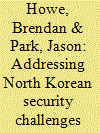

|
|
|
|
|
| Publication |
2014.
|
| Summary/Abstract |
Purpose-Discuss the potential of non-state centric economic cooperation.
Design/methodology/approach-Traditional engagement policies vis-à-vis North Korea have been state-centric, reciprocity-driven and ultimately, unsuccessful. This article proposes the promotion of sustainable, good-faith and meaningful economic exchanges by enrolling the active participation of North Korean elites through alignment with their vested interests.
Findings-Although controversial and even abhorrent from a normative perspective, the approach is eminently pragmatic and necessary to address the limited policy alternatives of an increasingly insecure regime which may eventually be forced to pursue drastic means to ensure its survival.
Practical implications-Non-state-centric international economic engagement is a non-exclusive policy prescription that seeks to broaden the range of viable policy options available to the North Korean regime.
|
|
|
|
|
|
|
|
|
|
|
|
|
|
|
|
| 2 |
ID:
130547
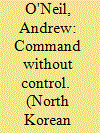

|
|
|
|
|
| Publication |
2014.
|
| Summary/Abstract |
Purpose-To assess the prospects for managing crises on the Korean Peninsula.
Design/methodology/approach-this article investigates North Korea's nuclear behavior using theories of crisis instability, which focus on the actual or perceived incentives of a nuclear weapon state to strike first during a crisis. Findings-Pyongyang's embryonic command and control capabilities mean that rapid escalation to full-scale conflict is a greater prospect than generally acknowledged. Practical implications-This raises questions about the ability of protagonists to avoid escalation resulting from miscalculation in future crises on the Korean Peninsula and has implications for policy makers in devising strategies to deter North Korea from undertaking behavior that risks escalation while reassuring elites in Pyongyang.
|
|
|
|
|
|
|
|
|
|
|
|
|
|
|
|
| 3 |
ID:
130548
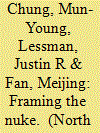

|
|
|
|
|
| Publication |
2014.
|
| Summary/Abstract |
Purpose-This cross-national study examines differences in news coverage of North Korea's first 2006 nuclear test in newspapers from the countries involved in the six-party talks with North Korea.
Design/methodology/approach-This population study is based on a quantitative content analysis of 564 newspaper articles from the highest-circulation native-language daily newspapers in countries involved in the six-party talks: the United States, China, South Korea, Japan, and Russia.
Findings-The framing analysis provides the significant differences of the news coverage: the U.S. newspaper demonstrated the strongest war journalism framing, the Chinese newspaper the unanimous peace journalism framing, the Japanese and Russian newspapers strong peace journalism framings, and the South Korean newspaper the strongest neutral framing.
Practical implications-This study found that the highest circulated newspapers of the countries involved in the six-party talks used different frames covering North Korea's first nuclear weapons test.
|
|
|
|
|
|
|
|
|
|
|
|
|
|
|
|
| 4 |
ID:
130551


|
|
|
|
|
| Publication |
2014.
|
| Summary/Abstract |
Purpose-This article discusses the development of the Internet in North Korea and the related challenges and opportunities.
Design/methodology/approach-This study gives a comprehensive overview of the development of the Internet in North Korea, starting with a history of the introduction of the Internet in North Korea, and then discusses various applications, challenges and opportunities based on reports and personal observations.
Findings-North Korea can no longer ignore the Internet, neither as a chance to further its intentions, e.g., in cyber warfare, as well as in national self-representation and business, nor as a threat due to the greater availability of knowledge in the country. Its countermeasures to the uncontrolled flow of information result in ever greater surveillance costs, while pushing further back the competitiveness of the country.
Originality/value-While there have been numerous reports on singular aspects of the opening of North Korea to information and communication industries, notably mobile communication, outsourcing, and cyber warfare, there has not yet been a comprehensive study of the issue.
|
|
|
|
|
|
|
|
|
|
|
|
|
|
|
|
| 5 |
ID:
130550
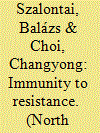

|
|
|
|
|
| Publication |
2014.
|
| Summary/Abstract |
Purpose-This article investigates whether certain social and subnational groups that have shown resistance against other one-party states might play a similar role in North Korea.
Design/methodology/approach-Comparing the DPRK with various Communist regimes and Baathist party-states in Syria and Iraq, this article examines the following social groups as potential factors of resistance: industrial workers, private entrepreneurs, and religious, ethnic and regional identities.
Findings-Resistance has not been wholly absent in North Korean, but the disaffected social groups have lacked sufficient bargaining power, while the state has occasionally refrained from steps that triggered protests in other countries.
Practical implications-By comparing the DPRK with various types of regimes (pre-reform Communist systems, partially market-oriented Communist systems, and Baathist party-states), the article also seeks to investigate whether the dynamics of North Korean society is largely unique, or if it can be at least partially explained by means of analogy.
|
|
|
|
|
|
|
|
|
|
|
|
|
|
|
|
| 6 |
ID:
130552
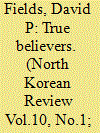

|
|
|
|
|
| Publication |
2014.
|
| Summary/Abstract |
Purpose-To argue that North Korean elites are "true believers" in the Kim personality cult. To present the possibilities for and limitations on using travel to North Korea as a research tool for North Korean scholars.
Design/methodology/approach-I used a tourist trip to North Korea as an opportunity to probe and discuss sensitive subjects with my North Korean guides. I tried to gauge their level of belief in the regime's propaganda.
Findings-It is likely that many North Korean elites are "true believers" in the Kim regime, even though they may entertain doubts about some of its methods.
Practical implications-The underlying stability of North Korea may be stronger than most would suspect or hope.
|
|
|
|
|
|
|
|
|
|
|
|
|
|
|
|
|
|
|
|
|